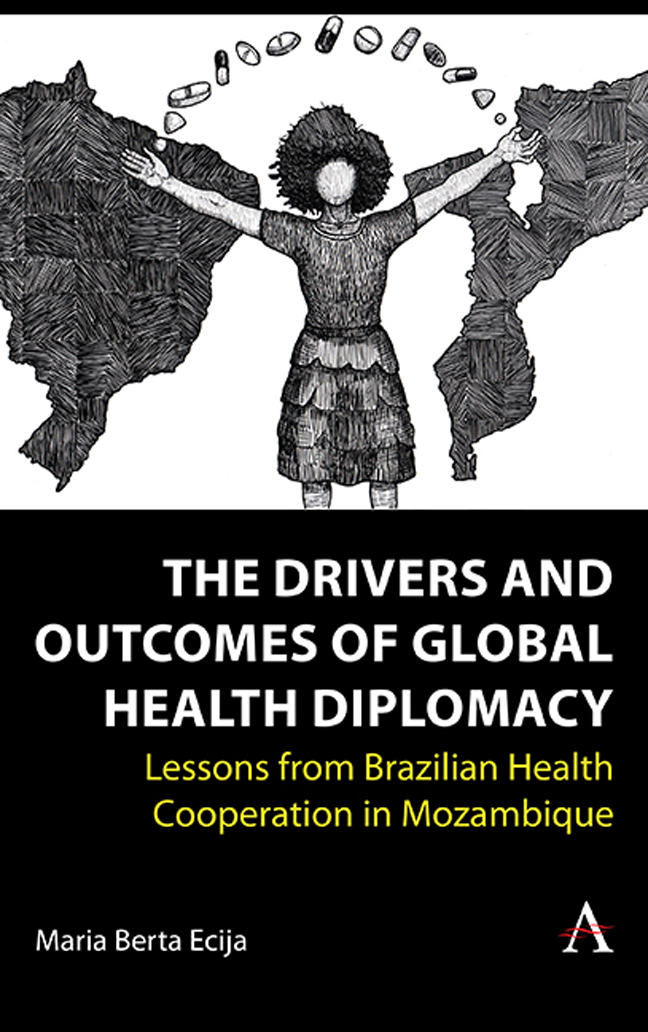 The Drivers and Outcomes of Global Health Diplomacy
The Drivers and Outcomes of Global Health Diplomacy Book contents
- Frontmatter
- Contents
- List of Abbreviations
- 1 Introduction and Methodology
- 2 Literature Review on Global Health Diplomacy – Brazil and Mozambique
- 3 Brazil and Global Health Diplomacy
- 4 Mozambique’s Foreign and Health Policy
- 5 Case Study of Sociedade Moçambicana de Medicamentos
- 6 Analysis and Outcomes
- 7 Conclusion
- Post-script: COVID-19 Disclaimer
- Bibliography
- Index
Post-script: COVID-19 Disclaimer
Published online by Cambridge University Press: 29 February 2024
- Frontmatter
- Contents
- List of Abbreviations
- 1 Introduction and Methodology
- 2 Literature Review on Global Health Diplomacy – Brazil and Mozambique
- 3 Brazil and Global Health Diplomacy
- 4 Mozambique’s Foreign and Health Policy
- 5 Case Study of Sociedade Moçambicana de Medicamentos
- 6 Analysis and Outcomes
- 7 Conclusion
- Post-script: COVID-19 Disclaimer
- Bibliography
- Index
Summary
I started my research on global health diplomacy in January 2017. My fieldwork in Brazil and Mozambique was undertaken in November 2018. In 2020, I was in my writing-up year in the United Kingdom, working on the analysis chapter, introduction and conclusion, when in March we experienced the COVID-19 outbreak in full force.
Back in 2017, whenever I mentioned to others that I was working on the concept and framework of global health diplomacy and its importance, or even trying to explain the relationship between health and international relations, it was difficult at times because it was not tangible to people. My experience of explaining these factors to a broader audience was challenging because linking one person’s health or a community to a greater web of global political, economic and human rights-oriented frameworks was not feasible.
In an ongoing globalised and interdependent world order, where the physical distances between people and goods are being diminished by technology and more transportation options, society could not grasp the idea of an outbreak. There are many reasons for this incomprehension: advances in science and technology, which boosted our confidence in terms of fighting outbreaks; more access to information; and the backward mindset that outbreaks could be contained in the geographical area in which they originally happened, without considering more significant levels of international interaction.
Therefore, submitting this PhD thesis, or indeed any work related to health in 2021, is challenging because the reader might be expecting an engagement with the COVID-19 crisis and its consequences. Thus, I want to clarify that it was unfeasible timewise to embed any analogy about the current coronavirus pandemic here. Also, the subject matter of this research is the field of global health diplomacy, its drivers and outcomes. However, I write about it in the context of cooperation, horizontality, mutual growth and multilateralism.
Maybe Fidler (2005) was right when he pointed out that certain politicians and societies perceive health as a subject of low politics. Until we had this major global crisis, people were very detached from the importance of global health and the several areas it encompasses. Nevertheless, nowadays, several members of the general public consider themselves avid experts on international health, based on their opinions.
The coronavirus crisis of 2020 has encouraged us to develop a new perspective on health.
- Type
- Chapter
- Information
- The Drivers and Outcomes of Global Health DiplomacyLessons from Brazilian Health Cooperation in Mozambique, pp. 227 - 230Publisher: Anthem PressPrint publication year: 2023
